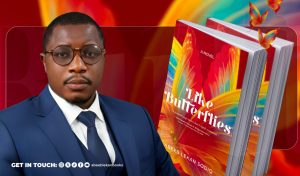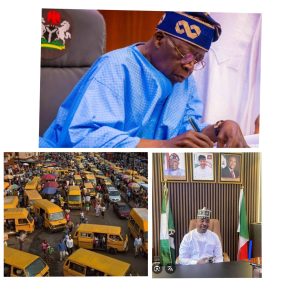
WASHINGTON, DC - APRIL 30: (AFP OUT) Nigerian President Muhammadu Buhari speaks during a meeting with US President Donald Trump in the Oval Office of the White House on April 30, 2018 in Washington, DC. The two leaders are scheduled to discuss a range of bilateral issues and hold a joint press conference later in the day. (Photo by Olivier Douliery-Pool/Getty Images)
Whoever advised President Buhari to grant media interviews last week and also address the nation on Saturday, June 12, did him a big favour. The intensity of media appearance was a good move, even if it came rather late. Nigerians may disagree with some of the things the President said in his media outings, but many of the myths constructed around him have been exploded, and that must be helpful to his administration.
The man that our team sat with and interviewed didn’t sound like a Jibrin from Sudan. He was alert, alive, informed, confident, relaxed, witty and capable of disarming humour. He was not the invalid or the senile old man that his critics say he is. He didn’t sound weak either. As the interview progressed, he had another function that he needed to attend, and we didn’t leave the Villa until about 11 pm.
Less than 12 hours later, the same man, the following day was in Lagos to commission rail, maritime, and security projects. His submission to a media conversation is also a form of protection for his spokespersons. Many have accused Garba Shehu, Femi Adesina and Alhaji Lai Mohammed of speaking for themselves, and not for the President, but we have all seen a President, speaking for himself, whose views do not contradict what his aides have been telling us.
Our interview with him also proved the point that there is no doubting the fact that President Muhammadu Buhari is effectively in charge. He knows what is going on. And he showed no hesitation in restating some of his reported views and taking ownership of them despite the controversial nature of those views.
But Nigerians still raise questions. I have been told for example that when the President said he would keep the question about what his government intends to do about Twitter to his heart, we should have followed up with an attack. Fine. The President spoke his mind. But were we supposed to rip out his heart from his chest to find out what he was keeping there? His answer was revealing enough.
When he spoke about the neighbouring Republic of Niger, he focussed more on the economic advantages of engaging Niger, on government to government, business to business and people to people basis, but the only word his critics heard was that he referred to having cousins in that country.
What we did was not a celebrity showcase, but serious journalism.
The ground-breaking nature of that interview must be further situated within the context of the different reactions to it along the North-South Nigerian divide. It must be noted that the feedback from the North has been overwhelmingly positive. From the South, majorly negative.
The President referred to IPOB, the Indigenous People of Biafra, as a “dot in a circle”. He proceeded to talk about how IPOB, he meant Igbos, are in every part of the country and how they will not be allowed to exit. He repeated the point that if they try to do so, government will speak to them in the language they will understand. The police and the military will be sent after them.
Southerners including the Yoruba Afenifere group are angry about this. But the Hausa/Fulani are happy that the President spoke firmly. It didn’t matter to them that he also added in that interview that bandits in the North will also be spoken to in “the language that they will understand.”
Buhari chose his audience tactically. People should stop saying he did not understand the questions. He did, and he made his point. And I insist: that was a very good interview, and an opportunity for the entire country.




793829 734716Quite intriguing topic , appreciate it for putting up. 817084
90450 388658Greetings! Quick question thats completely off topic. Do you know how to make your website mobile friendly? My site looks weird when browsing from my apple iphone. Im trying to discover a template or plugin that may well be able to correct this concern. In case you have any suggestions, please share. With thanks! 130393
对Telegram的功能感到好奇吗?访问Telegram中文版下载,获取最全面的信息。了解其速度、安全性以及在各种设备上的同步能力。
785973 721070Hello, you used to write great, but the last several posts have been kinda boringK I miss your super writings. Past few posts are just a little bit out of track! come on! 412283
258450 823673I like this weblog really considerably so significantly very good info . 341658
843199 464953my English teacher hate me cause i keep writing about somebody from The WANTED called Jay, she gives me evils and low 627386
903019 347756I believe 1 of your advertisings triggered my internet browser to resize, you might effectively want to put that on your blacklist. 440802
深入了解Telegram的隐私和安全承诺。访问TG中文版下载,了解其加密技术和用户至上的理念。
227893 42219Greetings! Quick question thats completely off topic. Do you know how to make your internet site mobile friendly? My weblog looks weird when viewing from my iphone. Im trying to locate a template or plugin that may possibly be able to fix this problem. In the event you have any recommendations, please share. Appreciate it! 381774
592503 383869We give you with a table of all of the emoticons that can be used on this application, and the meaning of each symbol. Though it may well take some initial effort on your part, the skills garnered from regular and strategic use of social media will create a strong foundation to grow your business on ALL levels. 453346
982856 919498Appreciate it for helping out, superb details. 893939
30712 687327Some truly interesting info , well written and broadly speaking user pleasant. 432496
574486 497219Aw, this was a actually nice post. In concept I wish to put in writing like this additionally ?taking time and actual effort to make an excellent article?however what can I say?I procrastinate alot and by no means appear to get something done. 70008
748386 531532Have you noticed the news has changed its approach lately? What used to neve be brought up or discussed has changed. It is that time to chagnge our stance on this though. 498408
589720 437901I gotta favorite this site it seems invaluable incredibly helpful 157444
147316 463458I like this internet site really much so significantly superb info . 276197
403838 858912As I site owner I believe the content material here is very superb, thanks for your efforts. 817121
762065 916759Likely to commence a business venture about the refers to disclosing your products and so programs not just to individuals near you, remember, though , to several potential prospects more by way of the www often. earn dollars 20312
301103 112135Many thanks for this specific info I was basically browsing all Search engines to discover it! 367894
898376 32492Hello! I just would wish to offer a huge thumbs up for that fantastic info youve here during this post. I will be returning to your web site to get much more soon. 407816